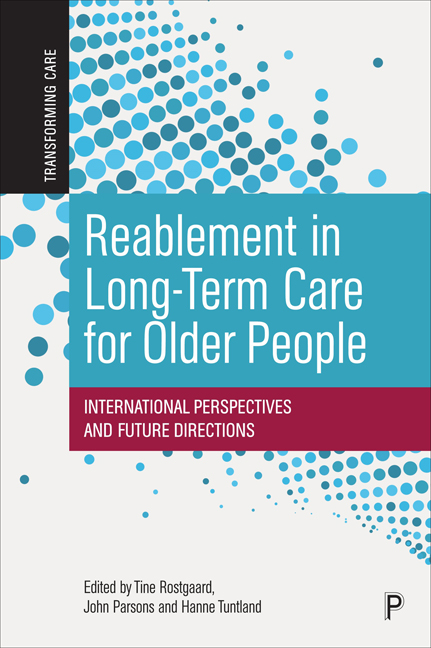2 - Perspectives on institutional characteristics, model features, and theories of reablement
Published online by Cambridge University Press: 18 January 2024
Summary
Introduction
As presented in Chapter 1, the Delphi-based definition of reablement is based on the understanding that characteristics, components, goals and target groups are common across national and disciplinary contexts. This chapter builds on the presentation on reablement in Chapter 1, but expands the scope to country-specific demographic information and welfare regimes. It has a comparative perspective presenting main regional characteristics of the countries represented in the book. The intention is that providing this overview will help the reader understand the country-specific contexts when reading the following chapters of the book. More generic reablement model features and theoretical aspects for reablement, are also given broad attention in the chapter.
A contextual presentation of the countries
Table 2.1 presents a cross-country analysis of seven countries: Australia, Denmark, England, the Netherlands, New Zealand, Norway, and Sweden. These countries are included in the book as they are among the ones where reablement as a policy and professional approach is most developed and has the longest history. The countries are situated geographically in four different regions of the world: Australasia (Australia and New Zealand), Scandinavia (Denmark, Norway and Sweden), and western (England) and central Europe (the Netherlands). As investigated in Chapter 3 by Feiring et al, there is a clear pattern of how reablement has travelled across and between countries in these regions, and quite interestingly, the travel between regions is irrespective of their different regional history of welfare regimes and social rights for long-term care. That is, reablement seems to be applied across variations of welfare systems.
Welfare regimes
Table 2.1 presents the three categories of welfare regimes which the countries represent. Australia, United Kingdom (England), and New Zealand represent liberal welfare regimes with low proportions of GDP devoted to long-term care (LTC) (1.5– 2.3 per cent; OECD average 1.5 per cent). This welfare regime is also characterised by having minimum but universal public LTC services; instead individualised and market-based care solutions are encouraged. In contrast, in the social-democratic welfare regime, there is universal and affordable provision of relatively generous public LTC services, and a considerable proportion of GDP goes to LTC (between 3.4– 3.7 per cent).
- Type
- Chapter
- Information
- Reablement in Long-term Care for Older PeopleInternational Perspectives and Future Directions, pp. 21 - 45Publisher: Bristol University PressPrint publication year: 2023



